War stokes further growth in forced displacement in first half 2014
The UN refugee agency on Tuesday reported that war in the Middle East, Africa and elsewhere had uprooted an estimated 5.5 million people during the first six months of 2014, signalling a further rise in the number of people forcibly displaced.
UNHCR’s new “Mid-Year Trends 2014” report shows that of the 5.5 million who were newly displaced, 1.4 million fled across international borders becoming refugees, while the rest were displaced within their own countries. Taking into account existing displaced populations, data revisions, voluntary returns and resettlement, the number of people being helped by UNHCR stood at 46.3 million as of mid-2014 – some 3.4 million more than at the end of 2013 and a record high.
Among the report’s main findings are that Syrians, for the first time, have become the largest refugee population under UNHCR’s mandate (Palestinians in the Middle East fall under the care of the UN Relief and Works Agency), overtaking Afghans, who had held that position for more than three decades. At more than 3 million as of June 2014, Syrian refugees now account for 23 per cent of all refugees being helped by UNHCR worldwide.
Despite dropping to second place, the 2.7 million Afghan refugees worldwide remain the largest protracted (at least five years) refugee population under UNHCR care. After Syria and Afghanistan, the leading countries of origin of refugees are Somalia (1.1 million), Sudan (670,000), South Sudan (509,000), the Democratic Republic of the Congo (493,000), Myanmar (480,000) and Iraq (426,000).
Pakistan, which hosts 1.6 million Afghan refugees, remains the biggest host country in absolute terms. Other countries with large refugee populations are Lebanon (1.1 million), Iran (982,000), Turkey (824,000), Jordan (737,000), Ethiopia (588,000), Kenya (537,000) and Chad (455,000).
By comparing the number of refugees to the size of a country’s population or economy, UNHCR’s report puts the contribution made by host nations into context: Relative to the sizes of their populations Lebanon and Jordan host the largest number of refugees, while relative to the sizes of their economies the burdens carried by Ethiopia and Pakistan are greatest.
In all, the number of refugees under UNHCR’s mandate reached 13 million by mid-year, the highest since 1996, while the total number of internally displaced people protected or assisted by the agency reached a new high of 26 million. As UNHCR only provides help for the internally displaced in countries where governments request its involvement, this figure does not include all internally displaced people worldwide.
“In 2014 we have seen the number of people under our care grow to unprecedented levels. As long as the international community continues to fail to find political solutions to existing conflicts and to prevent new ones from starting, we will continue to have to deal with the dramatic humanitarian consequences,” said UN High Commissioner for Refugees António Guterres.
“The economic, social and human cost of caring for refugees and the internally displaced is being borne mostly by poor communities, those who are least able to afford it. Enhanced international solidarity is a must if we want to avoid the risk of more and more vulnerable people being left without proper support.”
Another major finding in the report is the shift in the regional distribution of refugee populations. Until last year, the region hosting the largest refugee population was Asia and the Pacific. As a result of the crisis in Syria, the Middle East and North Africa have now become the regions hosting the largest number of refugees.
UNHCR’s Mid-Year Trends 2014 report is based on data from governments and the organization’s worldwide offices. As information available to UNHCR at this point in the year is incomplete it does not show total forced displacement globally (those figures are presented in June each year in UNHCR’s annual “Global Trends” report, which as of end 2013 showed that 51.2 million people were forcibly displaced worldwide). Nonetheless, the data it presents is a major component of the global total and an important indicator of worldwide refugee and IDP trends.
The full report can be downloaded here: http://unhcr.org/54aa91d89.html
Page 1 of 6
-

UNHCR’S 2025 Recommendations for the Polish and Danish Presidencies of the Council of the European Union (EU)
30 Jan 2025Let’s set the record straight: a humane and effective EU asylum system is possible. Solutions that protect refugees and address concerns of EU citizens do exist. These are UNHCR’s key recommendations for the 2025 Polish and Danish Presidencies of the EU Council: Implementing the Asylum Pact with safeguards benefits both refugees […]
-

Opinion: One Year On from the Tragic Shipwreck off Pylos
21 Jun 2024By: Maria Clara Martin, UNHCR Representative in Greece | Gianluca Rocco, Chief of Mission, IOM Greece
-
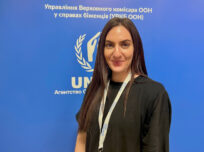
Ioanna Tzagnoun Kotaki, Dnipro, Ukraine
18 Aug 2023CCCM Sub-National Coordinator
-
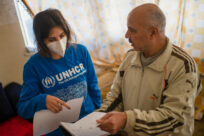
Evie Prastakou, Amman, Jordan
18 Aug 2023Associate External Relations Officer
-

Alexandros Voulgaris, Tapachula, Mexico
18 Aug 2023Associate Field Officer
-
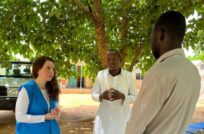
Anastasia Papakonstantinou, Gozbeida, Chad
18 Aug 2023Associate Resettlement and Complementary Pathways Officer
-

Antouaneta Saranti, Chișinău, Moldova
18 Aug 2023Associate Programme Officer
-
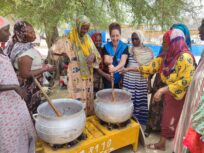
Pipina Katsari, Kinshasa, Democratic Republic of Congo
18 Aug 2023Associate Resettlement and Complementary Pathways Officer
-
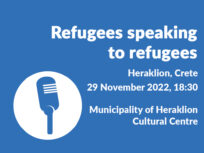
Invitation: Refugees speaking to refugees – Heraklion, Crete
29 Nov 2022UNHCR, the UN Refugee Agency, in Greece, in cooperation with the Development Agency of Heraklion, are holding on Tuesday 29 November 2022 at 18.30 at the Municipality of Heraklion Cultural Centre – Androgeo 4 str. – an open discussion on integration titled: “Refugees speaking to refugees”. Τhe invited speakers, refugees […]
-
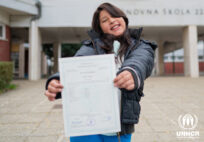
Workshop “Citizenship in Greece: Legislative Framework and Administrative Practices”
28 Nov 2022You are cordially invited to the Workshop on “Citizenship in Greece: Legislative Framework and Administrative Practices”, co-organized by the Greek Council for Refugees (GCR) and the European Network for Statelessness (ENS), with the support of UNHCR, the UN Refugee Agency. The workshop will take place on Wednesday 30 November 2022, […]
In This Section

Thematic film screenings on migration
Athens, 17 September 2020 – The Greek mission of the International Organization for Migration (IOM) and UNHCR, the UN Refugee Agency, in Greece, with the support of the Municipality of Ioannina, are co-organizing a thematic cycle of film screenings. The event aims to create an open channel of communication between […]


